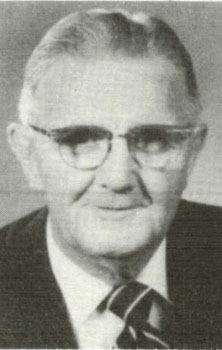
Dr. Julius Wayne Reitz (1908-1993)
Inducted 1997
Highlights
United Growers & Shippers
University of Florida IFAS
Farm Credit Administration
Citrus Fruit Advisory Committee
Research & Marketing Act of 1946
University of Florida President
Bio
Julius Wayne Reitz was born on January 1, 1908, in Olathe, Kansas. The Reitz family moved to Canon City, Colorado, where Reitz graduated from high school in 1926. Reitz attended Colorado State Agricultural and Mechanical College, served as student body president and winner of the Rocky Mountain Oratory Award. After graduation in 1930 Reitz took a job as assistant in Extension Service at the University of Illinois. In 1933, he also spent a year as a Junior Economic Consultant to the United Growers and Shippers. Reitz subsequently earned his masters degree from the University of Illinois (1935) and doctorate from the University of Wisconsin (1941). In 1934 Reitz joined the University of Florida/IFAS faculty as an assistant professor of agricultural economics, where he stayed for ten years. While there he become one of the University’s most productive scholars, publishing articles on topics such as farm management, farm finance and marketing.
From 1944 to 1948, Reitz worked as an economic consultant to the United Growers and Shippers Association in Orlando. During this time he also worked for the Farm Credit Administration and was an economist for the U.S. Department of Agriculture in Washington. Reitz returned to the University of Florida in 1949 as the university’s acting Dean of the College of Agriculture and later served as the Provost of the College of Agriculture. In 1953 Reitz became a member of the Citrus Fruit Advisory Committee under the provisions of the Research and Marketing Act of 1946.
In 1955 Reitz became the fifth president of the University of Florida–the first to be chosen from among university faculty. By the time Reitz left office in 1967, the University of Florida had emerged as one of the nation’s foremost public research universities. Reitz also helped guide the university though the turbulent times of racial integration without major incident. Reitz’s leadership resulted in the establishment of international agricultural programs in Burma and another in Central America. A Center for Tropical Agriculture was also added. During Reitz’s tenure the student population at the University grew from 9,000 to almost 20,000 students. Several campus landmarks were built during this time; including the Century Tower, the Health Science Center and the Library West, and the J. Wayne Reitz Student Union. After leaving his position as university president, Reitz continued his work at the university through the University of Florida Foundation.
Dr. Reitz married Frances Houston Millikan in 1936, and the couple had two daughters: Margaret and Marjorie. He credited his wife with many of his accomplishments and his family was the mainstay of his life. Reitz received many honors during his career, including several international awards, including: Panama’s Cross of Balboa, Norway’s Order of the North Star, and the Progressive Farmer’s Man of the Year. In addition, Reitz was named to Florida’s Agricultural Hall of Fame in 1993. Reitz also served with many organizations through his career. Reitz served as a health program advisor in Thailand with the Rockefeller Foundation and served as a director of the Escuela Agricola Pan Americana in Costa Rica.
